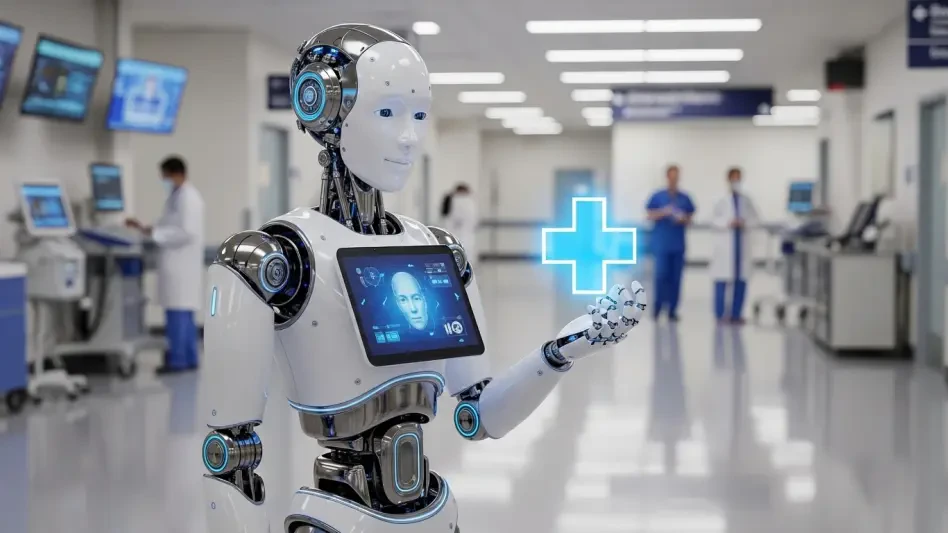Setting the Stage for AI’s Role in Healthcare
Imagine a world where a hospital’s diagnostic tools can predict a patient’s risk of complications before symptoms even appear, or where administrative tasks that once took hours are completed in mere minutes. This is no longer a distant dream but a reality unfolding across healthcare systems today, driven by the rapid integration of artificial intelligence (AI). With 88% of health systems already leveraging AI in various capacities, the technology is reshaping how care is delivered and managed, promising unprecedented efficiency and improved patient outcomes.
The surge in AI adoption, however, comes with a pressing challenge: ensuring that its implementation is ethical, secure, and sustainable. As health systems race to harness AI’s potential, questions about governance, data privacy, and equitable access loom large. This review delves into the transformative features of AI in healthcare, evaluates its performance across key areas, and explores the gaps that must be addressed to maximize its benefits.
Analyzing AI’s Features and Performance in Healthcare
Adoption Trends and Current Landscape
AI’s penetration into healthcare is striking, with a vast majority of health systems integrating the technology into their operations. From financial management to clinical care, AI tools are being deployed to tackle inefficiencies and enhance decision-making. Despite this widespread adoption, the maturity of implementation varies significantly, with many organizations still in the early stages of exploring AI’s full capabilities.
A notable trend is the preference for trusted partnerships when adopting AI solutions. Approximately 80% of health systems opt to collaborate with established vendors rather than new entrants, prioritizing familiarity and reliability in data handling. This cautious approach reflects an awareness of the risks associated with AI, even as enthusiasm for its potential continues to grow among stakeholders.
Financial and Administrative Applications
In the realm of finance and revenue cycle management, AI is proving to be a game-changer for health systems. By automating repetitive tasks such as billing and claims processing, these tools reduce operational costs and minimize human error. The ability to analyze vast datasets also enables more informed financial forecasting, helping organizations allocate resources more effectively.
Beyond cost savings, AI’s impact on administrative efficiency is profound. Tasks that once bogged down staff, like scheduling and documentation, are now streamlined, freeing up time for more strategic priorities. This shift not only boosts productivity but also allows healthcare administrators to focus on improving patient experiences rather than grappling with paperwork.
Clinical Operations and Patient Care Innovations
On the clinical front, AI is emerging as a powerful ally for healthcare providers. Diagnostic algorithms can analyze medical imaging with remarkable accuracy, often detecting conditions like cancer earlier than traditional methods. Personalized treatment plans, tailored to individual patient data, are another area where AI excels, offering a level of precision that was previously unattainable.
Real-world examples underscore AI’s value in patient care. In several hospitals, AI systems act as virtual assistants to physicians, reducing administrative burdens by summarizing patient records or flagging critical test results. Such applications not only enhance the quality of care but also allow clinicians to spend more time with patients, fostering better outcomes and satisfaction.
Emerging Use Cases and Stakeholder Sentiment
The scope of AI in healthcare continues to expand, with pilot programs and full-scale solutions implemented in 71% of surveyed health systems. Unique applications, such as AI-driven mental health support tools, are gaining traction, though they come with regulatory scrutiny. For instance, legislation in Illinois has banned unchecked AI use in therapy, ensuring that such tools are overseen by licensed professionals to protect patient well-being.
Stakeholder sentiment toward AI reflects a blend of optimism and caution. Physician interest has risen, with 35% expressing more excitement than concern in recent surveys, a slight uptick from previous years. While the potential to alleviate workload and improve diagnostics fuels enthusiasm, lingering worries about ethical implications and reliability highlight the need for careful integration.
Challenges and Barriers to Effective Deployment
Despite AI’s promise, significant hurdles remain in its widespread adoption. A glaring issue is the governance gap, with only 18% of health systems boasting mature oversight structures to manage AI’s risks. This discrepancy between adoption and regulation raises concerns about data security, bias in algorithms, and accountability in decision-making processes.
Resource constraints further complicate the landscape. Many health systems lack the tools or expertise to evaluate the return on investment for AI initiatives, with over 80% reporting immature programs for managing such investments. Ethical dilemmas, coupled with evolving regulatory frameworks, pose additional barriers, underscoring the urgency of developing robust strategies to guide AI use.
Reflecting on AI’s Journey and Path Forward
Looking back, the journey of AI in healthcare reveals a landscape of immense potential tempered by critical challenges. The technology has demonstrated remarkable capabilities in transforming financial operations, enhancing clinical care, and driving innovation through diverse applications. Yet, the persistent lag in governance structures and resource limitations casts a shadow over its achievements, reminding stakeholders of the work that lies ahead.
Moving forward, health systems must prioritize the establishment of comprehensive oversight frameworks to ensure AI is deployed responsibly. Collaborative efforts between vendors, regulators, and providers will be essential in addressing ethical concerns and building trust among patients and communities. By investing in training and resources to measure AI’s impact, the healthcare sector can pave the way for a future where innovation and accountability go hand in hand, unlocking the full promise of this transformative technology.









